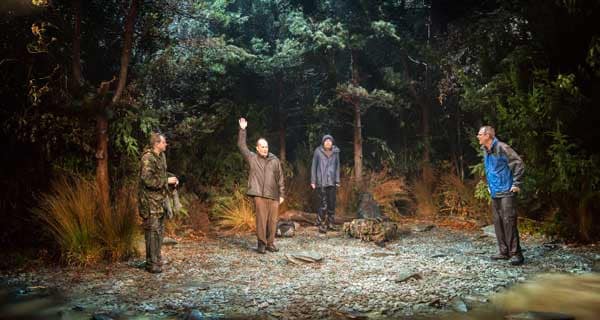
Neville’s Island
Duke Of Yorks Theatre
1 Star
As you enter the auditorium of the Duke of York’s Theatre, it is, frankly, impossible not to marvel at Robert Innes Hopkins’ set for Neville’s Island, Tim Firth’s “hit comedy” which is now playing there having transferred from Chichester.
It’s a cracking set. Nothing funny about it at all. It is a wholly realistic depiction of Rampshole Island, Derwentwater (the Cotswolds). Tall trees, thick bushes, a realistic shoreline covered in rocks and stones, a river with deep enough water for shallow swimming and serious stomping around – and rain, that fine, misty rain that comes when the foliage is so thick that it acts as a kind of absorption barrier, and the fat droplets of rain are turned into a lush sprinkle, a wet gentle fog of gossamer spray.
Those sitting in the front row are offered plastic ponchos to protect them from the water, and when the play starts and Adrian Edmondson’s Gordon and Neil Morrissey’s Neville make their water-logged, splashorific entrances, you can see why. Director Angus Jackson sets the tone right from the beginning: this is a play about laughing at the misfortunes of others, including fellow audience members who might get a quick dousing by a determined, stomping actor looking for a quick sight gag/cheap laugh.
Neville’s Island was written by Tim Firth and first performed in 1992 at Alan Ayckbourn’s Stephen Joseph Theatre in Scarborough. The style of writing in this play has a deal in common with the Ayckbourn style of that period: bitter, acerbic and based around characters who are essentially unlikeable and unknowable. There is an absence of heart, of fragility, of kindness, which is, ultimately, self-defeating.
In 1992 the notion of knocking corporate team bonding expeditions was very “in” and Neville’s Island is all about that. Four men who work together in a corporate environment are teamed up for an wilderness adventure, meant to make them bond, find and use skills they weren’t sure they had and work together to achieve a common goal. Of course, it all goes horribly wrong and they are stranded on an island in the dead of night with their boat dashed to pieces on the rocks, their clothes soaked, their provisions lost and no way to get help.
This production of Neville’s Island is, seemingly, set in 2014 rather than 1992. One of the men, Angus, has what appears to be a smartphone, not a device likely to have been available in 1992. And, unaccountably, given the other paraphernalia he has brought with him on the trip (a serious machete-knife, a camouflage cover sheet, a portable gas stove, a frypan etc) Angus has not thought to bring a charging device for his phone. So his phone goes dead after his one call to his wife who, mysteriously, does not answer when he calls. This lack of planning seems out of character for the man with the Mary Poppins style rucksack.
None of the set-up really rings true if the play is set in modern times. And if it is set in 1992, there is no sense of that either.
Time has not been kind to Firth’s play. The wheel has turned and the kind of corporate bonding activities lampooned here are passé and have been the subject of episodes of endless sitcoms. The vagaries of office life have been dissected and laughed at in The Office and it’s ilk with the result that everything that happens here seems tired, not especially funny and somewhat desperate. Lost meets Gilligan’s Island meets The Office – not a particular recipe for scintillating humour.
The star casting hinders rather than helps proceedings. Because they are stars, more is expected of them. But, at its sharpest, this is a gentle comedy. It simply needs four actors who can make the material work; using big names intensifies the expectations of the audience and leads purely to disappointment.
Adrian Edmonson is wasted as the dour complainer Gordon. There is nothing subversive or anarchic about Gordon and so Edmonson does not get a chance to live up to his reputation. It is the same with Neil Morrissey: his character, Neville, is a bit of a useless git (he steered the boat onto the rocks despite Edmonson’s warnings) and there is little trace of the Jack-the-lad/man behaving badly about him.
It’s not that either of them are particularly bad, it’s just that neither appears to be playing to their strengths or, more importantly, the expectations of their audience. It is curious casting indeed.
Miles Jupp is more successful as the “well-prepared” member of the troupe, with a happy disposition, an absent wife, an eye for a sausage that might go to waste and an over-excitable imagination. But there is nothing subtle about the performance.
As Roy, the “God-botherer” with a shady past involving a dead woman and a penchant for niggling about taking the Lord’s name in vain, Robert Webb is the best of the bunch, all wide-eyed, breezy gormlessness. Not content with being the one who insists on saying grace, Roy is also a bird-watcher.
Firth has composed a symphony of stereotypes for this Lord Of The Flies riff – the first Act ends on the discovery of blood on a tree and the fear that someone else is on the island with them. Pass me the conch.
The prospect of discovering what the blood was about, where Angus’ wife was, what Roy’s secret was and how the four get along was not sufficiently compelling to require attendance for the second Act. The titular Island may be an unknown quantity but it is not a place where laughter abides.
But, my word, that set is good.
